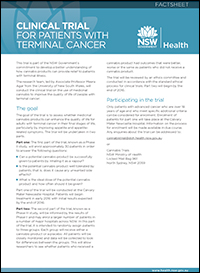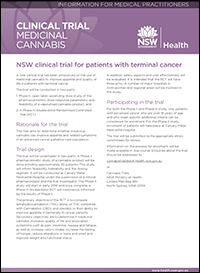Medical cannabis research
The first medical cannabis clinical trial in Australia will be conducted at the Calvary Mater Newcastle Hospital.
Patients will begin treatment in early 2016 with initial results expected by the end of 2016.
The goal of the two part clinical trial is to assess whether medicinal cannabis products can enhance the quality of life for adults with terminal cancer in their final stages of life, particularly by improving appetite and appetite-related symptoms.
 |
 |
| FACTSHEET 1: Clinical trial for patients with terminal cancer | FACTSHEET 2: Information for Practitioners |
Part 1 of the trial involves 30 participants, trying to answer the following three questions;
- Can a potential cannabis product be successfully given to patients by inhaling it as a vapour?
- Is the potential cannabis product well tolerated by patients, that is, does it cause any unwanted side effects?
- What is the ideal dose of the potential cannabis product and how often should it be given?
Part 2 of the trial may enrol a larger number of patients in a number of major hospitals across NSW.
Although this is the first time a clinical trial involving cannabis has taken place in Australia, many clinical trials have already been conducted in other places that appear to have had a similar purpose(s) and have already reported their conclusions.
To demonstrate this assertion, please find below, the details of some studies available online that specifically answer the three questions the NSW clinical trials are looking to answer, along with reference to a 2010 study that we believe already addresses the stated goals of the Australian trial, that being, to assess whether medicinal cannabis products can enhance the quality of life for adults with terminal cancer in their final stages of life, particularly by improving appetite and appetite-related symptoms.
Specific to q1; A clinical trial completed in 2012, successfully theorized that neuropathic pain could be reduced with vaporized cannabis. It can be found at the clinicaltrials.gov website;
The Analgesic Effect of Vaporized Cannabis on Neuropathic Pain.
University of California, Davis. NCT01037088
Last verified: April 2013.
Summary:
This study theorized that a low dose of vaporized cannabis could alleviate nerve injury pain.
Conditions:
Neuropathic Pain, Reflex Sympathetic Dystrophy, Peripheral Neuropathy, Post-herpetic Neuralgia, Spinal Cord Injury, Multiple Sclerosis.
Results:
Participants With 30% or Greater Reduction in Pain Intensity
[ Time Frame: baseline to six hours ]
[ Designated as safety issue: No ]
The primary outcome variable, VAS Pain Intensity, was assessed by asking participants to indicate the intensity of their current pain on a 100-mm visual analog scale (VAS) between 0 (no pain) and 100 (worst possible pain).
An assessment was performed before the administration of vaporized cannabis or placebo and hourly thereafter for six hours.
The clinical trial referred to above, resulted in the publication of the paper called, Low-dose vaporized cannabis significantly improves neuropathic pain.
Low Dose Vaporized Cannabis Significantly Improves Neuropathic Pain
Barth Wilsey, MD, Thomas D. Marcotte, PhD, Associate Professor, Reena Deutsch, PhD, Statistician, Ben Gouaux, Research Associate, Staci Sakai, Research Associate, and Haylee Donaghe, Research Associate
Barth Wilsey, VA Northern California Health Care System, Sacramento, CA, Department of Physical Medicine and Rehabilitation, University of California, Davis Medical Center;
PubMed | Full article: PubMedCentral
Specific to q2; In a paper from 2007, a randomized, double blind, clinical study successfully demonstrated that Vaporization of cannabis is a safe and effective mode of delivery of THC.
Vaporization as a smokeless cannabis delivery system: a pilot study.
Abrams DI, Vizoso HP, Shade SB, Jay C, Kelly ME, Benowitz NL.
Clin Pharmacol Ther. 2007 Nov;82(5):572-8. Epub 2007 Apr 11.
PMID: 17429350
Specifc to q3; The most recent public announcement we could see specifically regarding recommended medical cannabis dosage comes from the Health Canada website;
Information for Health Care Professionals.
(May 2013) Addendum to the Information for Health Care Professionals: Cannabis (marihuana, marijuana) and the cannabinoids (February 2013 version).
Following the most recent update to this document (February 2013), a study was published in the Netherlands tracking data obtained from the Dutch medical cannabis program over the years 2003-2010. The study reported that in a population of over 5,000 Dutch patients using cannabis for medical purposes, the average daily dose of dried cannabis (various potencies) used was 0.68 grams per day (range: 0.65 - 0.82 grams per day).
The prevalence and incidence of medicinal cannabis on prescription in The Netherlands.
Hazekamp A, Heerdink ER.
Eur J Clin Pharmacol. 2013 Aug;69(8):1575-80. doi: 10.1007/s00228-013-1503-y. Epub 2013 Apr 16.
PMID: 23588562
Specific to the stated goal of the Australian clinical trial goal,
The goal of the two part clinical trial is to assess whether medicinal cannabis products can enhance the quality of life for adults with terminal cancer in their final stages of life, particularly by improving appetite and appetite-related symptoms
we found this pilot study from 2010 called,
Delta-9-tetrahydrocannabinol may palliate altered chemosensory perception in cancer patients: results of a randomized, double-blind, placebo-controlled pilot trial.
Delta-9-tetrahydrocannabinol may palliate altered chemosensory perception in cancer patients: results of a randomized, double-blind, placebo-controlled pilot trial.
Brisbois TD, de Kock IH, Watanabe SM, Mirhosseini M, Lamoureux DC, Chasen M, MacDonald N, Baracos VE, Wismer WV.
Ann Oncol. 2011 Sep;22(9):2086-93. doi: 10.1093/annonc/mdq727. Epub 2011 Feb 22.
PMID: 21343383 | Full article: Oxford Journals.
Purpose:
To investigate delta-9-tetrahydrocannabinol's (THC) ability to increase food intake and improve food enjoyment for advanced cancer patients with taste and/or smell (chemosensory) abnormalities.
Results:
THC and placebo groups were comparable at baseline. Compared with placebo, THC-treated patients reported improved (P = 0.026) and enhanced (P < 0.001) chemosensory perception and food ‘tasted better’ (P = 0.04). Premeal appetite (P = 0.05) and proportion of calories consumed as protein increased compared with placebo (P = 0.008). THC-treated patients reported increased quality of sleep (P = 0.025) and relaxation (P = 0.045). QOL scores and total caloric intake were improved in both THC and placebo groups.
Conclusion:
THC may be useful in the palliation of chemosensory alterations and to improve food enjoyment for cancer patients.